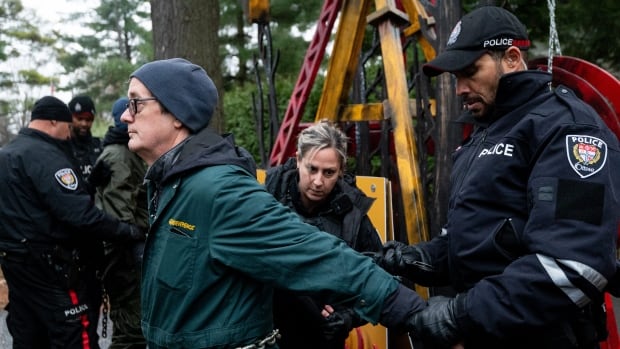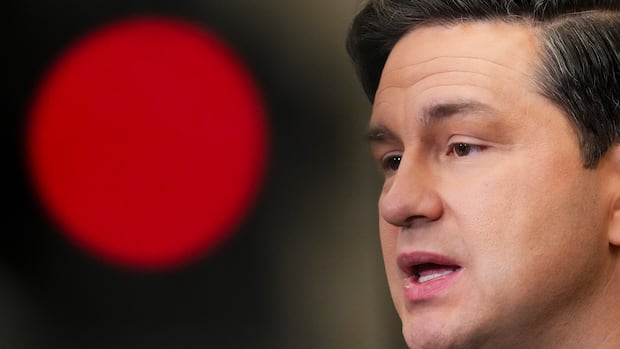Greenpeace activists chained themselves to a mockup of oil-extraction equipment outside the official residence of the Official Opposition leader Thursday morning.
It’s not clear whether Conservative Leader Pierre Poilievre and his family were at home at the Stornoway residence at the time.
Two protesters chained themselves to replica pumpjacks to call out what Greenpeace says is Poilievre’s “anti-climate agenda.”
In a media statement, Greenpeace said the protesters were arrested shortly after they arrived for mischief and intimidation and did not resist the police.
Greenpeace’s Keith Stewart and another activist chained themselves to a mockup of oil-extraction equipment outside the official residence of Conservative Leader Pierre Poilievre on Thursday morning.
The Ottawa Police Service said a dozen people gathered outside Stornoway shortly after 7 a.m.
“The group blocked access to the residence with a structure, and some proceeded to chain themselves to the structure, not allowing the family to pass,” the OPS statement says.
Charges are pending, police said.
“While I am being arrested, Poilievre is planning to give free passes to big polluters like oil and gas, securing more profits for the richest at the expense of Canadians’ futures,” Keith Stewart, one of the activists arrested and Greenpeace Canada’s senior energy strategist, said in a media statement.
“People in Canada deserve leaders who protect people and our climate, not polluters.”

CBC reached out to Poilievre’s office for comment.
Poilievre has said his yet-to-be-released climate plan will focus on “technology, not taxes.” He still hasn’t indicated how it would work.
The Conservative leader has vowed to cancel the consumer carbon tax and associated rebates, along with new clean fuel regulations, and has said he would not move forward with the proposed oil and gas pollution cap. The Conservative Party also has criticized the federal clean electricity regulations, arguing they will make life more expensive for Canadians.
It’s not clear whether a future Poilievre government would stick to Canada’s current 2030 climate target. However, Poilievre has said he is not proposing withdrawing from the landmark international climate treaty — the Paris Agreement — as former prime minister Stephen Harper did with a previous climate agreement.
Conservative Leader Pierre Poilievre responds to reporters’ questions about his emissions targets.
The 2016 Paris Agreement, which Canada signed, commits countries to working toward limiting warming to the critical threshold of 1.5 C above pre-industrial levels.
Poilievre has said he would approve new nuclear, hydroelectric and tidal power projects and support Canadian liquefied natural gas exports to Asian countries.
In its news release, Greenpeace calls liquefied natural gas “not a climate solution.”
Citing research, Greenpeace called it “a carbon bomb,” noting that leaks of methane, one of the most potent greenhouse gases, are worse than the carbon dioxide generated by burning coal.



